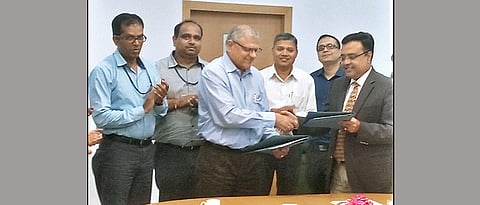

PUNE: CSIR-National Chemical Laboratory (CSIR-NCL), Pune signed a memorandum of understanding (MoU) with the Sinhgad Dental College and Hospital (SDCH), here on Tuesday to develop the dental applications of cellulose obtained from indigenous bacteria.
Cellulose is the most abundant and sustainable biopolymer available on Earth. Nano-cellulose, with special morphology, a high surface area and unique mechanical properties like crystallinity, has attracted more attention for various biotechnological and biomedical applications. Bacterial cellulose (BC), the nano-fibrillar form of cellulose, has been exploited as a material for diverse applications due to its unique characteristics. Although BC is structurally similar to plant cellulose, its unique physicochemical characteristics, such as high tensile strength, a pure form (without having hemi-cellulose and lignin components), greater crystallinity and moldability make it superior to plant.
In conventional dental root canal treatment, cotton pellets and a paper point (plant cellulose) have commonly been used. Besides, cellulose is the main constituent of several dental materials and finds application in dentistry for isolation in the form of cellulose wafers for isolation, paper points in endodontics and medicated paper points. These products have high consumption value in dentistry,” said the press release.
Bacterial cellulose has diversified application as it is biodegradable and can hold medicaments for varied niches and wounds in the oral cavity. Dr Syed G Dastager and his team from NCIM Resource Centre, CSIR-NCL has developed cellulose from indigenously isolated bacterial source with high yield. This has several advantages over plant cellulose and can be easily used in dentistry.
This collaborative MoU between CSIR-NCL and the College and Hospital is to use this unique cellulose in various endodontic, restorative, regenerative, periodontal and surgical applications in dentistry and compare them with the plant-based cellulose products available in the market and develop a new product in the field of endodontics, restorative, regenerative, periodontal and surgical applications in dentistry,” it added.
